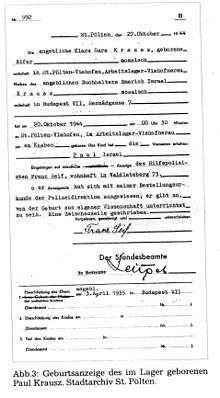Paul Kraus
| Paul Kraus | |
|---|---|
 Actual copy of Paul Kraus birth certificate as found in the St. Pölten, Austria archives | |
| Born | 20 October 1944 |
Paul Kraus (born 1944) is a Holocaust survivor and mesothelioma patient. Kraus was born in and survived a Nazi forced labor camp during World War II.[1] In 1997, Kraus was diagnosed with mesothelioma, a type of cancer caused by asbestos.[2] Despite his "terminal" diagnosis Kraus is considered to be the longest known mesothelioma survivor in the world.[3] Today, Kraus is a well known Australian author and cancer survivor whose writings focus on Australia, health, and spirituality.[4] His book Surviving Mesothelioma and Other Cancers: A Patient’s Guide is a best-selling book on the subject.[1]
Viehofen Forced-Labor Camp
Clara Kraus, a Hungarian Jew had a two-year-old boy (Peter) and was pregnant with Paul Kraus when the Nazis shipped her and her child to Auschwitz.[5] Due to rail destruction by Allied bombing, the journey ended at a forced labor camp established in the Viehofen flood plain near St. Pölten, Lower Austria.[6] Approximately 180 men, women and children lived in three barracks in the camp where they were used as slave labor for the state-owned Traisen-Wasserverband company in St. Pölten and the surrounding area.[6]
Paul Kraus was born in the camp on 20 October 1944.[5] Inadequate nutrition, lack of hygiene, shootings by the SS, failed attempts to escape, and bombings by the Allied Forces caused many deaths at the camp.[6] Despite these conditions, Clara Kraus escaped with her toddler (Peter) and infant son (Paul) in January 1945 and survived a cross-country trek in winter to Clara’s home in German-occupied Budapest.[5] There she was reunited with her husband who survived imprisonment in the Mauthausen-Gusen concentration camp whereupon the family immigrated to Australia after WWII.[5] As of today, there are only six living survivors of the Viehofen Forced-Labor Camp – Greta Balog, Olga Balog, Vera Mahler, Susan Fisher, Peter Kraus, and Paul Kraus.[6]
Mesothelioma
Paul Kraus received his BA at Macquarie University and a Master of Arts and Education from the University of Sydney.[7] During a summer vacation as an undergraduate student, he worked adjacent to an asbestos factory and his clothes and body were covered with fine asbestos dust.[8] Decades later, he was diagnosed with peritoneal mesothelioma, the asbestos cancer.[9] Due to his advanced metastases, doctors gave him little hope and suggested he had only weeks to live.[9][10] Kraus pursued a course of integrative care combining modern medicine, traditional medicine, herbal medicine, and alternative medicine.[4][7]
Over the last 30 years, Kraus has worked as an author and educator.[9] He has written several books including books co-written with Ian Gawler.[11]
Selected Works
- Faith, Hope, Love and Laughter – How They Heal
- Not So Fabulous 50s: Images of a Migrant Childhood
- A New Australian, a New Australia
- Surviving Cancer: Inspirational Stories of Hope and Healing
- Prayers, Promises & Prescriptions for Healing
- Surviving Mesothelioma and Other Cancers: A Patient's Guide
- Mother Courage: From the Holocaust to Australia
References
- 1 2 Lewin, Natasha (8 May 2013). "Tales from a Survivor: An Interview with Author Paul Kraus". The Tolucan.
- ↑ Baillie, Rebecca (24 May 2001). "Keeping fit helps man beat deadly cancer". Australian Broadcasting Corporation. Retrieved 7 May 2013.
- ↑ Branley, Alison (7 May 2013). "Survivor sees his illness as a 'gift'". Herald News. Retrieved 7 May 2013.
- 1 2 Dinneem, Martin (29 March 2008). "Stories Of Survival To Offer Inspiration". Newcastle Herald.
- 1 2 3 4 Brown, Malcolm (16 February 2011). "Mother who escaped SS with her infants". The Sydney Morning Herald. Retrieved 7 May 2013.
- 1 2 3 4 Granski, Miki. "The Viehofen Forced-Labor Camp (1944-5)" (PDF). Mahnmal Viehofen. Retrieved 7 May 2013.
- 1 2 Kraus, Paul (2005). Surviving Mesothelioma and Other Cancers: A Patient's Guide. Raleigh, North Carolina: Cancer Monthly, LLC. ISBN 978-0-9772901-1-6.
- ↑ Surviving Mesothelioma and Other Cancers: A Patient's Guide, p. 143
- 1 2 3 Watson, Chad (7 June 2002). "Living Proof". Newcastle Herald. Retrieved 7 May 2013.
- ↑ Roehrich, M.B., B.S., Dr. Eckard. "Foreword to Surviving Mesothelioma". Retrieved 12 May 2013.
- ↑ O’Connor, Michael (November 2012). "Prayers, Promises & Prescriptions". Aurora. 119 (22): 23. Retrieved 7 May 2013.